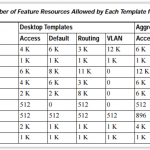The IEEE 802.1Q specification defines a standards-based mechanism not only to provide VLAN tagging but also for Class of Service (CoS) across Ethernet networks. Because the sound quality of an IP phone call can deteriorate if the data is sent without any sort of protection, the switch supports Quality of Service (QoS) based on IEEE …
Category Archive: Cisco Catalyst
Apr 07
Where Cisco catalyst switch stores VLAN information?
The short answer is: VLANs 1-1005 are stores in valn.dat file stored in FLASH VLANs 1006-4094 are stored in running-config and moved to starup-config after configuration is saved. The full story is a bit more complicated and involves VTP as well. Here are details. VLAN or VTP configuration changes in CatOS are written to NVRAM …
Mar 31
Unidirectional Link Detection Protocol
UDLD is a Layer 2 protocol enabled between adjacent switches. It uses MAC 01-00-0c-cc-cc-cc with Subnetwork Access Protocol (SNAP) High-Level Data Link Control (HDLC) protocol type 0x0111. UDLD packets contain information about sending the port’s device ID and port ID and the neighbor’s device ID and port ID. Neighbor devices with UDLD enabled send the …
Feb 04
IP Helper / DHCP Relay
The IP Helper address forwards a broadcast to a single specified IP. Before using the IP Helper command, you must first change the interface to prepare the router to relay broadcasts. The command is as follows: Switch# conf t Switch(config)#interface Fa0/1 Switch(config-if)#ip helper-address 192.168.1.254 Switch(config-if)#end Switch#wr mem This will configure the router to forward several …
Feb 02
Trunking/VLAN tagging (802.1Q)
IEEE 802.1Q is the networking standard that supports virtual LANs (VLANs) on an Ethernet network. The standard defines a system of VLAN tagging for Ethernet frames and the accompanying procedures to be used by bridges and switches in handling such frames. 802.1Q frame tagging Configuration: Switch#configure terminal Enter configuration commands, one per line. End with CNTL/Z. Swith(config)#int …
Feb 02
VTP Pruning and manual pruning
VTP Pruning VTP pruning offers a dynamic mechanism that automatically configures the allowed VLAN lists on trunks within a VTP domain. Based upon whether or not a switch has ports currently active within a VLAN, the switch dynamically indicates to the remote switch on the other side of a trunk that the traffic within the …
Feb 01
VTP v1/v2/v3
VLAN Trunking Protocol (VTP) is a Cisco proprietary protocol that propagates the definition of Virtual Local Area Networks (VLAN) on the whole local area network. To do this, VTP carries VLAN information to all the switches in a VTP domain. Important to remember about VTP: By defaul switch out of the box is in a …
Feb 01
Troubleshoot Err-disable recovery
What is Err-disable? If the configuration shows a port to be enabled, but software on the switch detects an error situation on the port, the software shuts down that port. In other words, the port is automatically disabled by the switch operating system software because of an error condition that is encountered on the port. …
Feb 01
Managing MAC address table on Cisco Catalyst switch
There are two types of MAC tables on Cisco Catalyst switches CAM and TCAM. CAM is Layer 2 table used in all switches and TCAM is a layer 3 table therefore is utilized to routing and other network layer CAM stands for Content Addressable Memory which is a special type of memory used by Cisco …
Jan 30
SDM Templates on Cisco switch
SDM (Switching Database Manager) is used on Cisco Catalyst switches to manage the memory usage of the TCAM. For example, a switch that is only used for switching won’t require any memory to store IPv4 routing information. On the other hand, a switch that is only used as a router won’t need much memory to …





